备战2018高考英语一轮复习重难点语法讲解 非谓语动词
文档属性
| 名称 | 备战2018高考英语一轮复习重难点语法讲解 非谓语动词 | 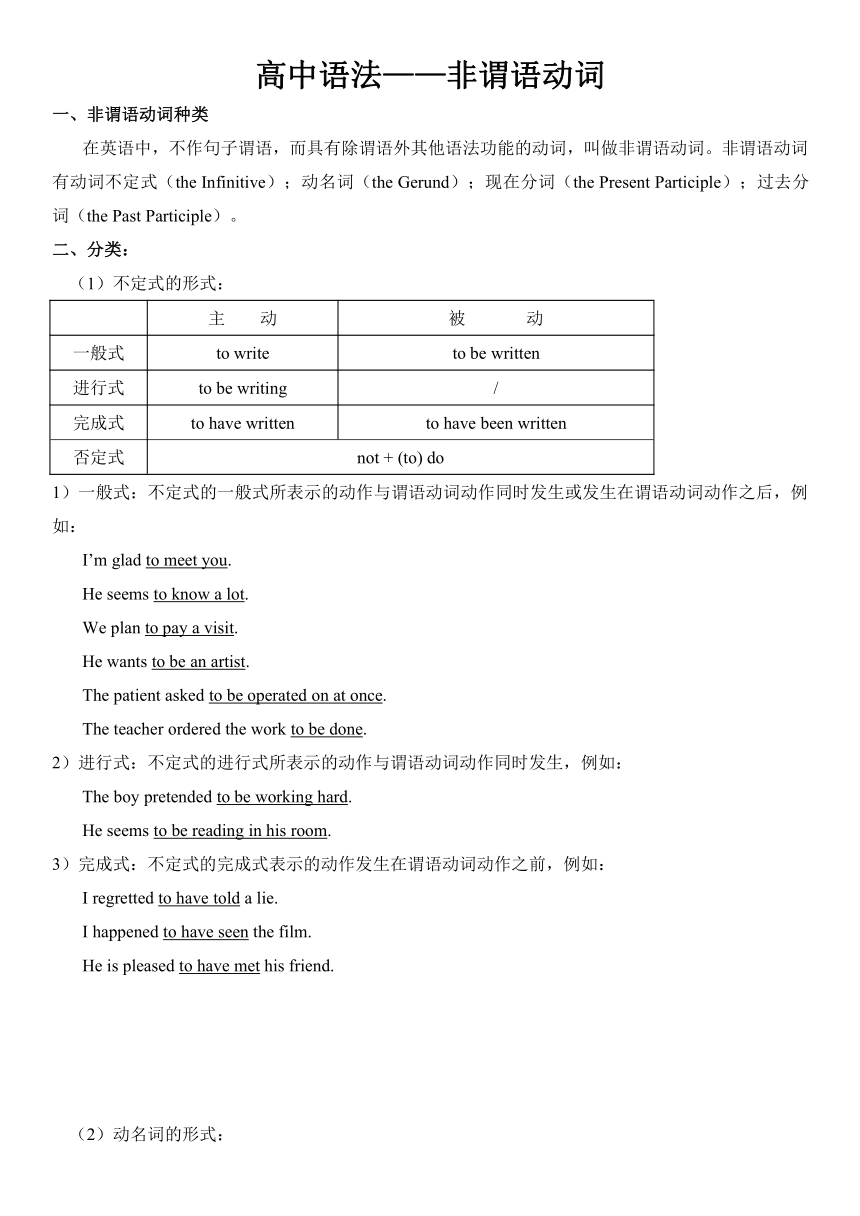 | |
| 格式 | zip | ||
| 文件大小 | 146.2KB | ||
| 资源类型 | 教案 | ||
| 版本资源 | 通用版 | ||
| 科目 | 英语 | ||
| 更新时间 | 2017-07-22 09:34:43 | ||
图片预览

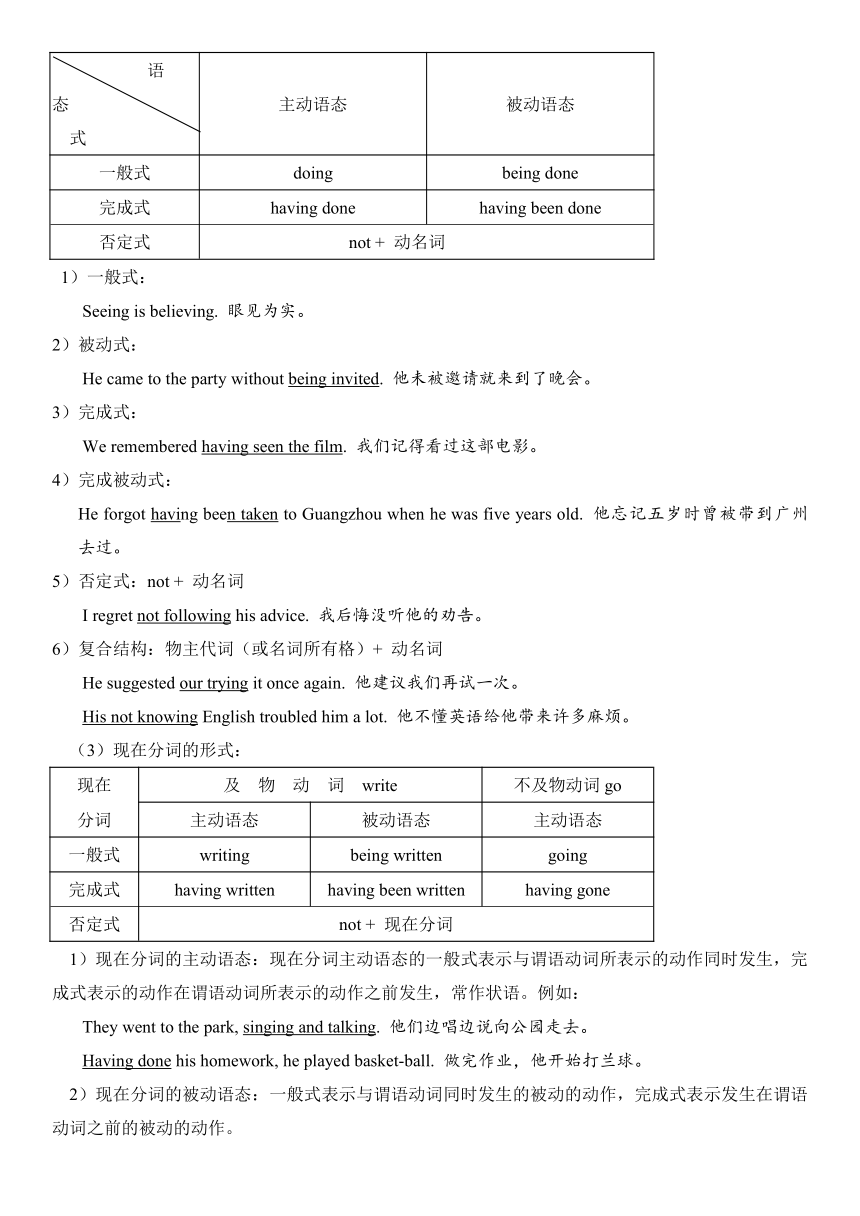
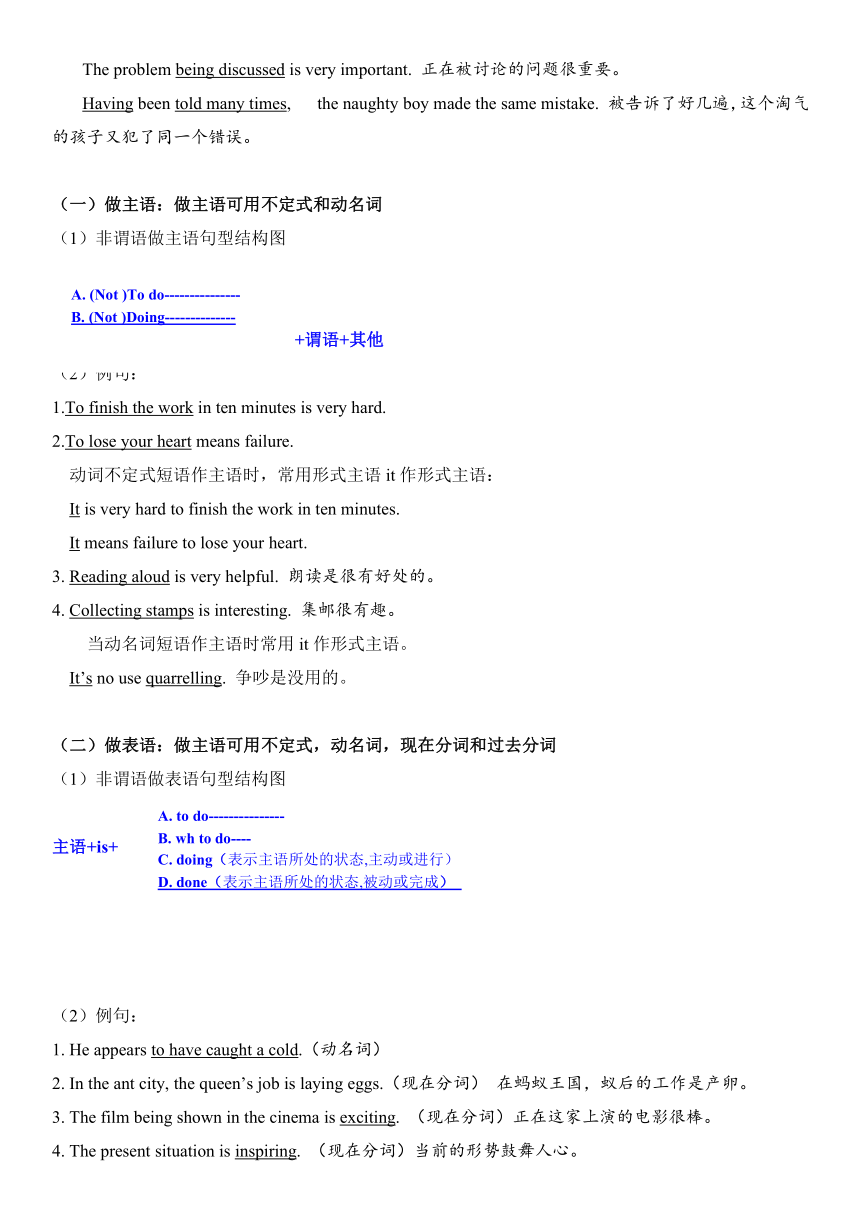
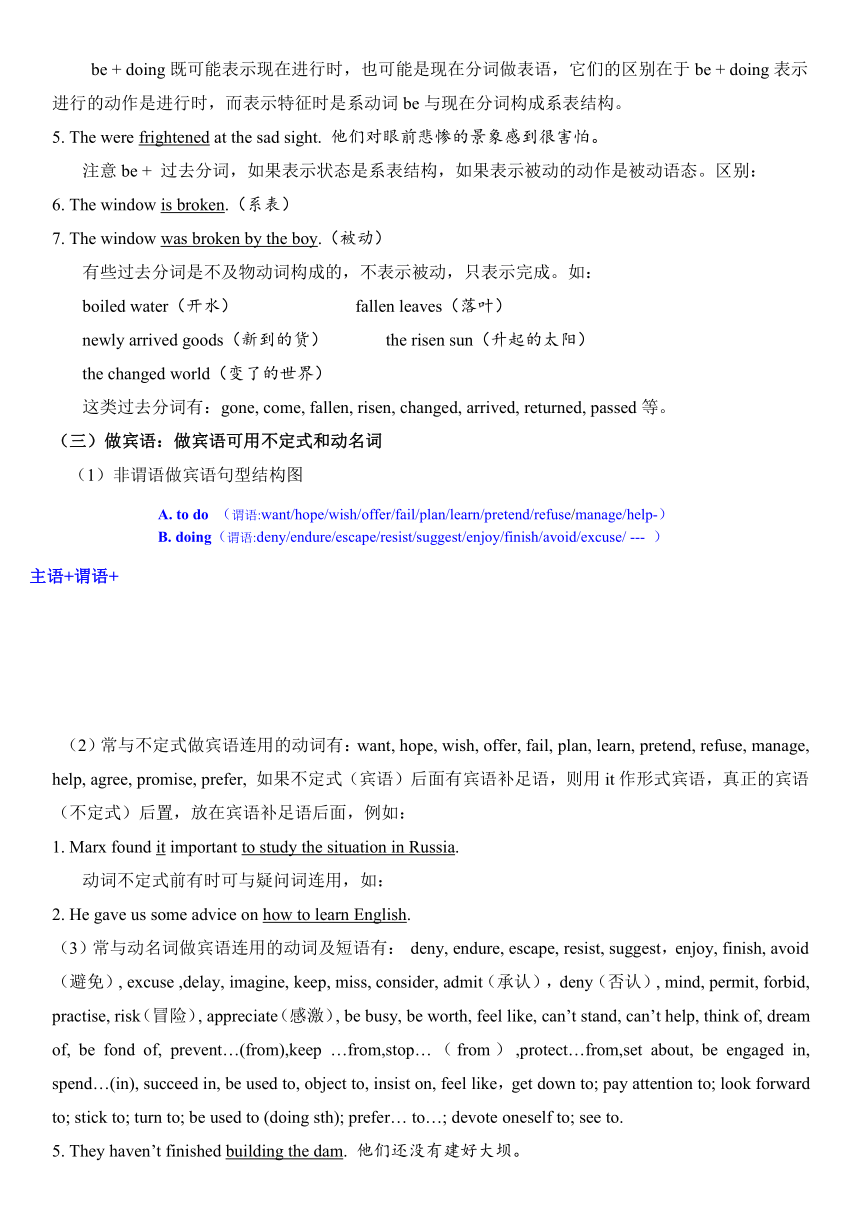
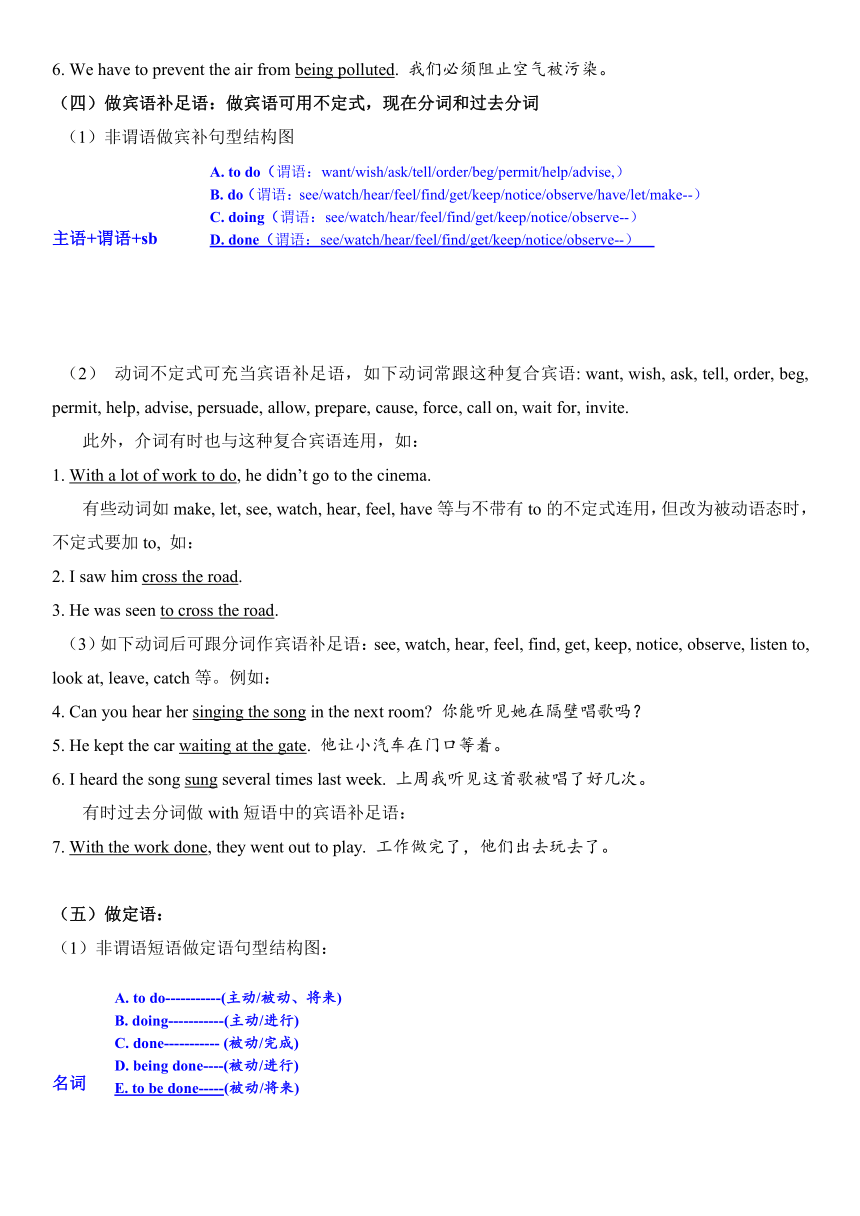
文档简介
高中语法——非谓语动词
一、非谓语动词种类
在英语中,不作句子谓语,而具有除谓语外其他语法功能的动词,叫做非谓语动词。非谓语动词有动词不定式(the
Infinitive);动名词(the
Gerund);现在分词(the
Present
Participle);过去分词(the
Past
Participle)。
二、分类:
(1)不定式的形式:
主
动
被
动
一般式
to
write
to
be
written
进行式
to
be
writing
/
完成式
to
have
written
to
have
been
written
否定式
not
+
(to)
do
1)一般式:不定式的一般式所表示的动作与谓语动词动作同时发生或发生在谓语动词动作之后,例如:
I’m
glad
to
meet
you.
He
seems
to
know
a
lot.
We
plan
to
pay
a
visit.
He
wants
to
be
an
artist.
The
patient
asked
to
be
operated
on
at
once.
The
teacher
ordered
the
work
to
be
done.
2)进行式:不定式的进行式所表示的动作与谓语动词动作同时发生,例如:
The
boy
pretended
to
be
working
hard.
He
seems
to
be
reading
in
his
room.
3)完成式:不定式的完成式表示的动作发生在谓语动词动作之前,例如:
I
regretted
to
have
told
a
lie.
I
happened
to
have
seen
the
film.
He
is
pleased
to
have
met
his
friend.
(2)动名词的形式:
语
态
式
主动语态
被动语态
一般式
doing
being
done
完成式
having
done
having
been
done
否定式
not
+
动名词
1)一般式:
Seeing
is
believing.
眼见为实。
2)被动式:
He
came
to
the
party
without
being
invited.
他未被邀请就来到了晚会。
3)完成式:
We
remembered
having
seen
the
film.
我们记得看过这部电影。
4)完成被动式:
He
forgot
having
been
taken
to
Guangzhou
when
he
was
five
years
old.
他忘记五岁时曾被带到广州去过。
5)否定式:not
+
动名词
I
regret
not
following
his
advice.
我后悔没听他的劝告。
6)复合结构:物主代词(或名词所有格)+
动名词
He
suggested
our
trying
it
once
again.
他建议我们再试一次。
His
not
knowing
English
troubled
him
a
lot.
他不懂英语给他带来许多麻烦。
(3)现在分词的形式:
现在
及
物
动
词
write
不及物动词go
分词
主动语态
被动语态
主动语态
一般式
writing
being
written
going
完成式
having
written
having
been
written
having
gone
否定式
not
+
现在分词
1)现在分词的主动语态:现在分词主动语态的一般式表示与谓语动词所表示的动作同时发生,完成式表示的动作在谓语动词所表示的动作之前发生,常作状语。例如:
They
went
to
the
park,
singing
and
talking.
他们边唱边说向公园走去。
Having
done
his
homework,
he
played
basket-ball.
做完作业,他开始打兰球。
2)现在分词的被动语态:一般式表示与谓语动词同时发生的被动的动作,完成式表示发生在谓语动词之前的被动的动作。
The
problem
being
discussed
is
very
important.
正在被讨论的问题很重要。
Having
been
told
many
times,
the
naughty
boy
made
the
same
mistake.
被告诉了好几遍,这个淘气的孩子又犯了同一个错误。
(一)做主语:做主语可用不定式和动名词
(1)非谓语做主语句型结构图
+谓语+其他
(2)例句:
1.To
finish
the
work
in
ten
minutes
is
very
hard.
2.To
lose
your
heart
means
failure.
动词不定式短语作主语时,常用形式主语it作形式主语:
It
is
very
hard
to
finish
the
work
in
ten
minutes.
It
means
failure
to
lose
your
heart.
3.
Reading
aloud
is
very
helpful.
朗读是很有好处的。
4.
Collecting
stamps
is
interesting.
集邮很有趣。
当动名词短语作主语时常用it作形式主语。
It’s
no
use
quarrelling.
争吵是没用的。
(二)做表语:做主语可用不定式,动名词,现在分词和过去分词
(1)非谓语做表语句型结构图
主语+is+
(2)例句:
1.
He
appears
to
have
caught
a
cold.(动名词)
2.
In
the
ant
city,
the
queen’s
job
is
laying
eggs.(现在分词)
在蚂蚁王国,蚁后的工作是产卵。
3.
The
film
being
shown
in
the
cinema
is
exciting.
(现在分词)正在这家上演的电影很棒。
4.
The
present
situation
is
inspiring.
(现在分词)当前的形势鼓舞人心。
be
+
doing既可能表示现在进行时,也可能是现在分词做表语,它们的区别在于be
+
doing表示进行的动作是进行时,而表示特征时是系动词be与现在分词构成系表结构。
5.
The
were
frightened
at
the
sad
sight.
他们对眼前悲惨的景象感到很害怕。
注意be
+
过去分词,如果表示状态是系表结构,如果表示被动的动作是被动语态。区别:
6.
The
window
is
broken.(系表)
7.
The
window
was
broken
by
the
boy.(被动)
有些过去分词是不及物动词构成的,不表示被动,只表示完成。如:
boiled
water(开水)
fallen
leaves(落叶)
newly
arrived
goods(新到的货)
the
risen
sun(升起的太阳)
the
changed
world(变了的世界)
这类过去分词有:gone,
come,
fallen,
risen,
changed,
arrived,
returned,
passed等。
(三)做宾语:做宾语可用不定式和动名词
(1)非谓语做宾语句型结构图
主语+谓语+
(2)常与不定式做宾语连用的动词有:want,
hope,
wish,
offer,
fail,
plan,
learn,
pretend,
refuse,
manage,
help,
agree,
promise,
prefer,
如果不定式(宾语)后面有宾语补足语,则用it作形式宾语,真正的宾语(不定式)后置,放在宾语补足语后面,例如:
1.
Marx
found
it
important
to
study
the
situation
in
Russia.
动词不定式前有时可与疑问词连用,如:
2.
He
gave
us
some
advice
on
how
to
learn
English.
(3)常与动名词做宾语连用的动词及短语有:
deny,
endure,
escape,
resist,
suggest,enjoy,
finish,
avoid(避免),
excuse
,delay,
imagine,
keep,
miss,
consider,
admit(承认),deny(否认),
mind,
permit,
forbid,
practise,
risk(冒险),
appreciate(感激),
be
busy,
be
worth,
feel
like,
can’t
stand,
can’t
help,
think
of,
dream
of,
be
fond
of,
prevent…(from),keep
…from,stop…(from),protect…from,set
about,
be
engaged
in,
spend…(in),
succeed
in,
be
used
to,
object
to,
insist
on,
feel
like,get
down
to;
pay
attention
to;
look
forward
to;
stick
to;
turn
to;
be
used
to
(doing
sth);
prefer…
to…;
devote
oneself
to;
see
to.
5.
They
haven’t
finished
building
the
dam.
他们还没有建好大坝。
6.
We
have
to
prevent
the
air
from
being
polluted.
我们必须阻止空气被污染。
(四)做宾语补足语:做宾语可用不定式,现在分词和过去分词
(1)非谓语做宾补句型结构图
主语+谓语+sb
(2)
动词不定式可充当宾语补足语,如下动词常跟这种复合宾语:
want,
wish,
ask,
tell,
order,
beg,
permit,
help,
advise,
persuade,
allow,
prepare,
cause,
force,
call
on,
wait
for,
invite.
此外,介词有时也与这种复合宾语连用,如:
1.
With
a
lot
of
work
to
do,
he
didn’t
go
to
the
cinema.
有些动词如make,
let,
see,
watch,
hear,
feel,
have等与不带有to的不定式连用,但改为被动语态时,不定式要加to,
如:
2.
I
saw
him
cross
the
road.
3.
He
was
seen
to
cross
the
road.
(3)如下动词后可跟分词作宾语补足语:see,
watch,
hear,
feel,
find,
get,
keep,
notice,
observe,
listen
to,
look
at,
leave,
catch等。例如:
4.
Can
you
hear
her
singing
the
song
in
the
next
room
你能听见她在隔壁唱歌吗?
5.
He
kept
the
car
waiting
at
the
gate.
他让小汽车在门口等着。
6.
I
heard
the
song
sung
several
times
last
week.
上周我听见这首歌被唱了好几次。
有时过去分词做with短语中的宾语补足语:
7.
With
the
work
done,
they
went
out
to
play.
工作做完了,他们出去玩去了。
(五)做定语:
(1)非谓语短语做定语句型结构图:
名词
说明:
1.选A与被修饰词之间构成主谓和动宾关系,且表示将来的含义。
2.选B与被修饰词之间构成主谓关系,且表示进行的含义
3.选C与被修饰词之间构成动宾关系,且表示完成的含义
4.选D与被修饰词之间构成动宾关系,且表示进行的含义
5.选E与被修饰词之间构成动宾关系,且表示将来的含义
6.A,E的区别:选A在句中有do的逻辑主语,选D在句中无do的逻辑主语。
(2)不定式做定语:
动词不定式做定语,放在所修饰的名词或代词后。与所修饰名词有如下关系:
1)动宾关系:
1.
I
have
a
meeting
to
attend.
注意:不定式为不及物动词时,所修饰的名词如果是地点、工具等,应有必要的介词,如:
2.
He
found
a
good
house
to
live
in.
3.
The
child
has
nothing
to
worry
about.
4.
What
did
you
open
it
with
如果不定式修饰time,
place,
way,可以省略介词:
5.
He
has
no
place
to
live.
6.
This
is
the
best
way
to
work
out
this
problem.
如果不定式所修饰名词是不定式动作承受者,不定式可用主动式也可用被动式:
7.
Have
you
got
anything
to
sent
8.
Have
you
got
anything
to
be
sent
2)说明所修饰名词的内容:
9.We
have
made
a
plan
to
finish
the
work.
3)被修饰名词是不定式逻辑主语:
He
is
the
first
to
get
here.
不定式可用在the
first,
the
second以及the
last,
the
only和最高级等后面作定语。
She
likes
to
listen
to
Mr.
Li’s
lessons,
so
she
is
always
the
first
to
come
and
the
last
to
leave.
(3)动名词做定语:
1.
He
can’t
walk
without
a
walking-stick.
他没有拐杖不能走路。
2.
Is
there
a
swimming
pool
in
your
school.
你们学校有游泳池吗?
(4)现在分词做定语:现在分词作定语,在含义上表主动或进行,也可表示经常性,习惯性的动作。当分词单独做定语时,放在所修饰的名词前,如:The
changing
world(正在发生的世界),如果是分词短语做定语放在名词后。
1.
In
the
following
years
he
worked
even
harder.
在后来的几年中,他学习更努力了。
2.
The
man
speaking
to
the
teacher
is
our
monitor’s
father.
正与老师谈话的那个人是我们班长的父亲。
(六)做状语:
(1)非谓语做状语句型结构图
1)状语置于主句前:
,主语+谓语+其他。
1)做时间状语(doing/done/having
done/having
been
done):
__
__
a
satisfactory
operation,
the
patient
recovered
from
illness
very
quickly.
A.
Having
been
given
B.
Having
given
C.
Giving
D.
Being
given
____
_a
satisfactory
operation,
the
doctor
believed
the
patient
would
recover
from
his
illness
very
soon..
A.
Having
been
given
B.
Having
given
C.
Giving
D.
Being
given
with
the
threat
of
water
shortages,
Beijing
and
Shanghai
are
taking
effective
measures
to
save
water
and
protect
water
resources.
A.Face
B.Faced
C.Facing
D.To
face
When
if
she
would
request
a
rise,the
actress
noted
that
money
was
not
important.
A.asked
B.being
asked
C.having
asked
D.asking
When
different
cultures,we
often
pay
attention
only
to
the
differences
without
noticing
the
many
similarities.
A.compared
B.being
compared
C.comparing
D.having
compared
6.
____
how
to
do
the
homework,
I
went
to
ask
my
teacher
for
help.
A.
Not
to
know
B.
Not
knowing
C.
Knowing
not
D.
Not
known
2)表目的(to
do):
out
of
the
difficult
situation,the
restaurant
is
now
making
efforts
to
improve
the
quality
of
service.
A.Getting
B.Got
C.Having
got
D.To
get
the
mixture,
the
teacher
showed
it
around
the
classroom.
A.To
see
B.More
students
to
see
C.For
more
students
to
see
D.Seen
4)表原因(doing/done):
,
Mary
had
to
stay
at
home
to
look
after
her.
A.Being
ill
B.To
be
ill
C.Her
mother
was
ill
D.Her
mother
being
ill
2.
by
his
grandparents,Jimmy
wasn’t
used
to
living
with
his
parents.
A.To
bring
up
B.To
be
brought
up
C.Brought
up
D.Being
brought
up
3.
all
her
spare
time
to
her
study
during
the
three
years,she
finally
took
the
first
place
in
her
school
in
the
College
Entrance
Examination
and
received
the
admission
notice
from
her
dream
university.
A.Devoted
B.Having
devoted
C.To
be
devoted
D.She
had
devoted
4.
good
and
sweet,this
kind
of
apple
was
soon
sold
out
in
the
market.
A.Tasted
B.Tasting
C.Having
been
tasted
D.Being
tasted
5.
__________
tomorrow's
lessons,
I
have
no
time
to
go
out
with
you.
A.
Not
preparing
B.
Not
prepare
C.
Not
being
prepared
D.
Not
having
prepared
5)做方式和伴随(doing):
_____their
students,
the
famous
teacher
came
into
the
hall.
A.
Followed
B.
Followed
by
C.
Being
followed
D.
Having
been
followed
2.
and
short
of
breath
,
Andy
and
Ruby
were
the
first
to
reach
the
top
of
Mount
Tai
.
A.To
be
tired
B.Tired
C.Tiring
D.Being
tired
3.
_____
their
hats
into
the
air,
the
fans
of
the
winning
team
let
out
loud
shouts
of
victory.
A.
To
throw
B.
Thrown
C.
Throwing
D.
Being
thrown
4.
______
and
happy,
Tony
stood
up
and
accepted
the
prize.
A.Surprising
B.Surprised
C.Being
surprised
D.To
be
surprising
6)做条件状语(doing/done):
If
________
to
a
high
temperature
,
water
can
be
turned
into
vapour
.
A.
heat
B.
to
heat
C.
heating
D.
heated
2.
to
the
right,you
will
find
the
house
you
are
looking
for.You
cannot
miss
it.
A.You
turn
B.Turn
C.To
be
turning
D.Turning
3.
___________
the
past,
our
life
is
much
better.
A.
Comparing
with
B.
Be
compared
with
C.
To
compare
with
D.
Compared
with
4.
Unless
_____
to
speak,
you
should
remain
silent
at
the
conference.
A.invited
B.inviting
C.being
invited
D.having
invited
7)做让步状语(doing/done):
Though
to
stop
to
take
a
rest,the
farmer
went
on
working
till
sunset.
A.told
B.being
told
C.telling
D.having
told
2
that
she
didn’t
do
a
good
job,
I
don’t
think
I
am
abler
than
her.
A.To
have
said
B.Having
said
C.To
say
D.Saying
3.
Though
_____
money,
his
parents
managed
to
send
him
to
university.
A
lacked
B
lacking
of
C
lacking
D
lacked
in
2)状语置于主句后:
主语+谓语+其他,
说明:1.
选择A,B时句子的主语与非谓语的主语构成主谓关系,选择D时句子的主语与非谓语的主语构成动宾关系
2.
选择A时做目的状语,意为“为了----”但做目的状语在句子后面一般不用逗号。
3.
选择B时表示伴随,结果和目的。
4.
这种句式不用CE做状语
(2)非谓语动词做状语例句
1)做时间状语(doing/done):
A
Turkish
Airlines
plane
crashed
while
to
land
at
Amsterdam's
Schipol
Airport.
A.having
attempted
B.to
be
attempted
C.attempting
D.attempted
I
got
to
the
office
early
that
day,
____
_the
7:30
train
from
Paddington.
A.
having
caught
B.
caught
C.
to
catch
D.
catch
2)表目的(to
do/doing):
Brandon
worked
for
hours
after
school
money
for
her
education.
A.making
B.made
C.to
make
D.having
made
He
sent
me
the
e-mail,
to
get
some
further
information
for
his
research.
A.hoped
B.hoping
C.to
hope
D.hope
I
wouldn’t
want
to
go
back
an
employee
now
that
I
havc
been
selfemploye
A.to
be
B.have
been
C.be
D.to
being
Napoleon
spoke
so
loudly
as
to
__________
in
front
of
his
soldiers.
A.
hear
B.
be
heard
C.
listen
D.
be
listened
5.
Schools
across
China
are
expected
to
hire
50,000
college
graduates
this
year
as
short-term
teachers,
almost
three
times
the
number
hired
last
year,
reduce
unemployment
pressures.
A.
help
B.
to
have
helped
C.
to
help
D.
having
helped
3)表结果(to
do/doing):
The
storm
left
,
a
lot
of
damage
to
this
area
.
(全1)
A.caused
B.to
have
caused
C.to
cause
D.having
caused
The
three
nations
were
wise
enough
not
the
agreement
until
they
could
discuss
it
further.
A.to
sign
B.signing
C.having
signed
D.to
have
signed
Dinosaurs
have
completely
died
out
on
the
earth,
never
again.
A.to
be
seen
B.being
seen
C.seen
D.having
been
seen
What
made
me
sad
was
that
I
went
to
see
her
the
day
before
yesterday
her
dead
on
her
bed.
A.to
find
B.finding
C.found
D.find
It
rained
continuously
for
a
week,
completely
_____
our
holiday.
A.ruining
B.
to
ruin
C.
ruined
D.
ruins
The
young
men
hurried
to
the
restaurant,
only
_____
the
singer
had
left.
A.to
tell
B.
to
be
told
C.
telling
D.
told
In
April,
2009,
President
Hu
inspected
the
warships
in
Qingdao,
the
60th
anniversary
of
the
founding
of
the
PLA
Navy.
A.
marking
B.
marked
C.
having
marked
D.
being
marked
4)表原因(to
do/doing/done):
Good-bye,
Mr
Jones.
I'm
pleased
__________.
A.
for
meeting
you
B.
to
meet
you
C.to
have
been
meeting
you
D.
to
have
met
you
We
often
provide
our
children
with
toys,
footballs
or
basketballs,
____
that
all
children
like
these
things.
(全国3)
A.
thinking
B.
think
C.
to
think
D.
thought
5)做方式状语,表示伴随(doing)::
She
came
in
,
_______by
a
group
of
children
.
A.following
B.
followed
C.
to
follow
D.
follow
As
the
light
turned
green,
I
stood
for
a
moment,
not
______,and
asked
myself
what
I
was
going
to
do.
A.moved
B.moving
C.to
move
D.being
moved
The
manager
finished
the
whole
day's
work
and
stood
up,
______
himself.
A.stretching
B.stretched
C.stretch
D.to
stretch
The
student
corrected
his
paper
carefully,
____
the
professor's
suggestions.
A.
follow
B.
following
C.
followed
D.
being
followed
Towards
evening,
the
patient
opened
his
mouth
as
if
_____
something
to
his
son.
A.said
B.
say
C.
to
say
D.
to
have
said
6)做条件状语(doing/done):
He
won’t
attend
the
meeting
unless
to
give
a
speech.
A.invited
B.inviting
C.being
invited
D.he
will
be
invited
Michael’s
new
house
is
like
a
huge
palace,
with
his
old
one.
A.
comparing
B.
compares
C.
to
compare
D.
compared
非谓语动词练习:
1.______
more
attention,the
trees
could
have
grown
better.
A.To
give
B.Having
given
C.Given
D.Giving
2.The
first
textbooks
______
for
teaching
English
as
a
foreign
language
came
out
in
the
16th
century.
A.to
be
written
B.written
C.being
written
D.having
written
3.The
missing
boys
were
last
seen
______
near
the
river.
A.to
play
B.play
C.to
be
playing
D.playing
4.______
in
thought,he
almost
ran
into
the
car
in
front
of
him.
A.To
lose
B.Lost
C.Having
lost
D.Losing
5.When
passing
me
he
pretended
______
me.
A.to
see
B.not
having
seen
C.to
have
not
seen
D.not
to
have
seen
6.The
children
insisted
______
there
on
foot.
A.they
going
B.they
would
go
C.on
their
going
D.going
7.He
still
remembers
______
to
Shanghai
when
he
was
very
young.
A.taking
B.being
taken
C.taken
D.having
taken
8.______
the
railway
station,we
had
a
break,only
______
the
train
had
left.
A.Arriving
at;to
find
B.Coming
to;discovering
that
C.On
arriving
at;finding
out
D.Hurrying
to;to
have
found
out
9.With
the
boy
______
the
way,we
had
no
trouble
______
the
way
______
to
Zhongshan
Park.
A.leading;finding;leading
B.to
lead;found;to
lead
C.led;finding;led
D.leading;found;led
10.______
these
pictures,I
couldn’t
help
thinking
of
those
days
when
I
was
in
Being
and
______
from
the
top
of
a
thirty-storeyed
building,Beijing
looks
more
beautiful.
A.Seeing;seen
B.Seen;seeing
C.Seeing;seeing
D.Seen;seen
11.I
can
hardly
imagine
Peter
______
across
the
Atlantic
Ocean
in
five
days.(NMET)
A.to
have
sailed
B.to
sail
C.sailing
D.sail
12.If
you
wave
your
book
in
front
of
your
face,you
can
feel
the
air
______
against
your
face.(MET)
A.moved
B.moving
C.moves
D.to
move
13.______
is
known
to
all,China
will
be
an
______
and
powerful
country
in
20
or
30
years
time.
A.That;advancing
B.This;advanced
C.As;advanced
D.It;advancing
14.While
shopping,people
sometimes
cant
help
______
into
buying
something
they
dont
really
need.
A.persuade
B.persuading
C.being
persuaded
D.be
persuaded
15.There
was
terrible
noise
______
the
sudden
burst
of
light.
A.followed
B.following
C.to
be
followed
D.being
followed
A.
(Not
)To
do---------------
B.
(Not
)Doing--------------
A.
to
do---------------
B.
wh
to
do----
C.
doing(表示主语所处的状态,主动或进行)
D.
done(表示主语所处的状态,被动或完成)
A.
to
do
(谓语:want/hope/wish/offer/fail/plan/learn/pretend/refuse/manage/help-)
B.
doing(谓语:deny/endure/escape/resist/suggest/enjoy/finish/avoid/excuse/
---
)
A.
to
do(谓语:want/wish/ask/tell/order/beg/permit/help/advise,)
B.
do(谓语:see/watch/hear/feel/find/get/keep/notice/observe/have/let/make--)
C.
doing(谓语:see/watch/hear/feel/find/get/keep/notice/observe--)
D.
done(谓语:see/watch/hear/feel/find/get/keep/notice/observe--)
A.
to
do-----------(主动/被动、将来)
B.
doing-----------(主动/进行)
C.
done-----------
(被动/完成)
D.
being
done----(被动/进行)
E.
to
be
done-----(被动/将来)
A.
(Not
)To
do(主谓/目的)
B.
(Not
)Doing(主谓/时间,原因,条件和让步)
C.
(Not
)Having
done(主谓/谓语之前的动作)
D.
(Not
)Done(动宾/原因,时间,条件,让步和伴随)
E.
(Not
)Having
been
done(动宾/谓语之前的动作)
A.
(not
)to
do(主谓/目的不用逗号隔开/结果)
B.
(not
)doing(主谓/伴随,结果和目的)
C.
(not
)done(动宾/伴随,结果和目的)
D.(not
)Having
done(主谓/谓语之前的动作)
E.
(not)
to
have
done(主谓/谓语之前的动作/原因)
一、非谓语动词种类
在英语中,不作句子谓语,而具有除谓语外其他语法功能的动词,叫做非谓语动词。非谓语动词有动词不定式(the
Infinitive);动名词(the
Gerund);现在分词(the
Present
Participle);过去分词(the
Past
Participle)。
二、分类:
(1)不定式的形式:
主
动
被
动
一般式
to
write
to
be
written
进行式
to
be
writing
/
完成式
to
have
written
to
have
been
written
否定式
not
+
(to)
do
1)一般式:不定式的一般式所表示的动作与谓语动词动作同时发生或发生在谓语动词动作之后,例如:
I’m
glad
to
meet
you.
He
seems
to
know
a
lot.
We
plan
to
pay
a
visit.
He
wants
to
be
an
artist.
The
patient
asked
to
be
operated
on
at
once.
The
teacher
ordered
the
work
to
be
done.
2)进行式:不定式的进行式所表示的动作与谓语动词动作同时发生,例如:
The
boy
pretended
to
be
working
hard.
He
seems
to
be
reading
in
his
room.
3)完成式:不定式的完成式表示的动作发生在谓语动词动作之前,例如:
I
regretted
to
have
told
a
lie.
I
happened
to
have
seen
the
film.
He
is
pleased
to
have
met
his
friend.
(2)动名词的形式:
语
态
式
主动语态
被动语态
一般式
doing
being
done
完成式
having
done
having
been
done
否定式
not
+
动名词
1)一般式:
Seeing
is
believing.
眼见为实。
2)被动式:
He
came
to
the
party
without
being
invited.
他未被邀请就来到了晚会。
3)完成式:
We
remembered
having
seen
the
film.
我们记得看过这部电影。
4)完成被动式:
He
forgot
having
been
taken
to
Guangzhou
when
he
was
five
years
old.
他忘记五岁时曾被带到广州去过。
5)否定式:not
+
动名词
I
regret
not
following
his
advice.
我后悔没听他的劝告。
6)复合结构:物主代词(或名词所有格)+
动名词
He
suggested
our
trying
it
once
again.
他建议我们再试一次。
His
not
knowing
English
troubled
him
a
lot.
他不懂英语给他带来许多麻烦。
(3)现在分词的形式:
现在
及
物
动
词
write
不及物动词go
分词
主动语态
被动语态
主动语态
一般式
writing
being
written
going
完成式
having
written
having
been
written
having
gone
否定式
not
+
现在分词
1)现在分词的主动语态:现在分词主动语态的一般式表示与谓语动词所表示的动作同时发生,完成式表示的动作在谓语动词所表示的动作之前发生,常作状语。例如:
They
went
to
the
park,
singing
and
talking.
他们边唱边说向公园走去。
Having
done
his
homework,
he
played
basket-ball.
做完作业,他开始打兰球。
2)现在分词的被动语态:一般式表示与谓语动词同时发生的被动的动作,完成式表示发生在谓语动词之前的被动的动作。
The
problem
being
discussed
is
very
important.
正在被讨论的问题很重要。
Having
been
told
many
times,
the
naughty
boy
made
the
same
mistake.
被告诉了好几遍,这个淘气的孩子又犯了同一个错误。
(一)做主语:做主语可用不定式和动名词
(1)非谓语做主语句型结构图
+谓语+其他
(2)例句:
1.To
finish
the
work
in
ten
minutes
is
very
hard.
2.To
lose
your
heart
means
failure.
动词不定式短语作主语时,常用形式主语it作形式主语:
It
is
very
hard
to
finish
the
work
in
ten
minutes.
It
means
failure
to
lose
your
heart.
3.
Reading
aloud
is
very
helpful.
朗读是很有好处的。
4.
Collecting
stamps
is
interesting.
集邮很有趣。
当动名词短语作主语时常用it作形式主语。
It’s
no
use
quarrelling.
争吵是没用的。
(二)做表语:做主语可用不定式,动名词,现在分词和过去分词
(1)非谓语做表语句型结构图
主语+is+
(2)例句:
1.
He
appears
to
have
caught
a
cold.(动名词)
2.
In
the
ant
city,
the
queen’s
job
is
laying
eggs.(现在分词)
在蚂蚁王国,蚁后的工作是产卵。
3.
The
film
being
shown
in
the
cinema
is
exciting.
(现在分词)正在这家上演的电影很棒。
4.
The
present
situation
is
inspiring.
(现在分词)当前的形势鼓舞人心。
be
+
doing既可能表示现在进行时,也可能是现在分词做表语,它们的区别在于be
+
doing表示进行的动作是进行时,而表示特征时是系动词be与现在分词构成系表结构。
5.
The
were
frightened
at
the
sad
sight.
他们对眼前悲惨的景象感到很害怕。
注意be
+
过去分词,如果表示状态是系表结构,如果表示被动的动作是被动语态。区别:
6.
The
window
is
broken.(系表)
7.
The
window
was
broken
by
the
boy.(被动)
有些过去分词是不及物动词构成的,不表示被动,只表示完成。如:
boiled
water(开水)
fallen
leaves(落叶)
newly
arrived
goods(新到的货)
the
risen
sun(升起的太阳)
the
changed
world(变了的世界)
这类过去分词有:gone,
come,
fallen,
risen,
changed,
arrived,
returned,
passed等。
(三)做宾语:做宾语可用不定式和动名词
(1)非谓语做宾语句型结构图
主语+谓语+
(2)常与不定式做宾语连用的动词有:want,
hope,
wish,
offer,
fail,
plan,
learn,
pretend,
refuse,
manage,
help,
agree,
promise,
prefer,
如果不定式(宾语)后面有宾语补足语,则用it作形式宾语,真正的宾语(不定式)后置,放在宾语补足语后面,例如:
1.
Marx
found
it
important
to
study
the
situation
in
Russia.
动词不定式前有时可与疑问词连用,如:
2.
He
gave
us
some
advice
on
how
to
learn
English.
(3)常与动名词做宾语连用的动词及短语有:
deny,
endure,
escape,
resist,
suggest,enjoy,
finish,
avoid(避免),
excuse
,delay,
imagine,
keep,
miss,
consider,
admit(承认),deny(否认),
mind,
permit,
forbid,
practise,
risk(冒险),
appreciate(感激),
be
busy,
be
worth,
feel
like,
can’t
stand,
can’t
help,
think
of,
dream
of,
be
fond
of,
prevent…(from),keep
…from,stop…(from),protect…from,set
about,
be
engaged
in,
spend…(in),
succeed
in,
be
used
to,
object
to,
insist
on,
feel
like,get
down
to;
pay
attention
to;
look
forward
to;
stick
to;
turn
to;
be
used
to
(doing
sth);
prefer…
to…;
devote
oneself
to;
see
to.
5.
They
haven’t
finished
building
the
dam.
他们还没有建好大坝。
6.
We
have
to
prevent
the
air
from
being
polluted.
我们必须阻止空气被污染。
(四)做宾语补足语:做宾语可用不定式,现在分词和过去分词
(1)非谓语做宾补句型结构图
主语+谓语+sb
(2)
动词不定式可充当宾语补足语,如下动词常跟这种复合宾语:
want,
wish,
ask,
tell,
order,
beg,
permit,
help,
advise,
persuade,
allow,
prepare,
cause,
force,
call
on,
wait
for,
invite.
此外,介词有时也与这种复合宾语连用,如:
1.
With
a
lot
of
work
to
do,
he
didn’t
go
to
the
cinema.
有些动词如make,
let,
see,
watch,
hear,
feel,
have等与不带有to的不定式连用,但改为被动语态时,不定式要加to,
如:
2.
I
saw
him
cross
the
road.
3.
He
was
seen
to
cross
the
road.
(3)如下动词后可跟分词作宾语补足语:see,
watch,
hear,
feel,
find,
get,
keep,
notice,
observe,
listen
to,
look
at,
leave,
catch等。例如:
4.
Can
you
hear
her
singing
the
song
in
the
next
room
你能听见她在隔壁唱歌吗?
5.
He
kept
the
car
waiting
at
the
gate.
他让小汽车在门口等着。
6.
I
heard
the
song
sung
several
times
last
week.
上周我听见这首歌被唱了好几次。
有时过去分词做with短语中的宾语补足语:
7.
With
the
work
done,
they
went
out
to
play.
工作做完了,他们出去玩去了。
(五)做定语:
(1)非谓语短语做定语句型结构图:
名词
说明:
1.选A与被修饰词之间构成主谓和动宾关系,且表示将来的含义。
2.选B与被修饰词之间构成主谓关系,且表示进行的含义
3.选C与被修饰词之间构成动宾关系,且表示完成的含义
4.选D与被修饰词之间构成动宾关系,且表示进行的含义
5.选E与被修饰词之间构成动宾关系,且表示将来的含义
6.A,E的区别:选A在句中有do的逻辑主语,选D在句中无do的逻辑主语。
(2)不定式做定语:
动词不定式做定语,放在所修饰的名词或代词后。与所修饰名词有如下关系:
1)动宾关系:
1.
I
have
a
meeting
to
attend.
注意:不定式为不及物动词时,所修饰的名词如果是地点、工具等,应有必要的介词,如:
2.
He
found
a
good
house
to
live
in.
3.
The
child
has
nothing
to
worry
about.
4.
What
did
you
open
it
with
如果不定式修饰time,
place,
way,可以省略介词:
5.
He
has
no
place
to
live.
6.
This
is
the
best
way
to
work
out
this
problem.
如果不定式所修饰名词是不定式动作承受者,不定式可用主动式也可用被动式:
7.
Have
you
got
anything
to
sent
8.
Have
you
got
anything
to
be
sent
2)说明所修饰名词的内容:
9.We
have
made
a
plan
to
finish
the
work.
3)被修饰名词是不定式逻辑主语:
He
is
the
first
to
get
here.
不定式可用在the
first,
the
second以及the
last,
the
only和最高级等后面作定语。
She
likes
to
listen
to
Mr.
Li’s
lessons,
so
she
is
always
the
first
to
come
and
the
last
to
leave.
(3)动名词做定语:
1.
He
can’t
walk
without
a
walking-stick.
他没有拐杖不能走路。
2.
Is
there
a
swimming
pool
in
your
school.
你们学校有游泳池吗?
(4)现在分词做定语:现在分词作定语,在含义上表主动或进行,也可表示经常性,习惯性的动作。当分词单独做定语时,放在所修饰的名词前,如:The
changing
world(正在发生的世界),如果是分词短语做定语放在名词后。
1.
In
the
following
years
he
worked
even
harder.
在后来的几年中,他学习更努力了。
2.
The
man
speaking
to
the
teacher
is
our
monitor’s
father.
正与老师谈话的那个人是我们班长的父亲。
(六)做状语:
(1)非谓语做状语句型结构图
1)状语置于主句前:
,主语+谓语+其他。
1)做时间状语(doing/done/having
done/having
been
done):
__
__
a
satisfactory
operation,
the
patient
recovered
from
illness
very
quickly.
A.
Having
been
given
B.
Having
given
C.
Giving
D.
Being
given
____
_a
satisfactory
operation,
the
doctor
believed
the
patient
would
recover
from
his
illness
very
soon..
A.
Having
been
given
B.
Having
given
C.
Giving
D.
Being
given
with
the
threat
of
water
shortages,
Beijing
and
Shanghai
are
taking
effective
measures
to
save
water
and
protect
water
resources.
A.Face
B.Faced
C.Facing
D.To
face
When
if
she
would
request
a
rise,the
actress
noted
that
money
was
not
important.
A.asked
B.being
asked
C.having
asked
D.asking
When
different
cultures,we
often
pay
attention
only
to
the
differences
without
noticing
the
many
similarities.
A.compared
B.being
compared
C.comparing
D.having
compared
6.
____
how
to
do
the
homework,
I
went
to
ask
my
teacher
for
help.
A.
Not
to
know
B.
Not
knowing
C.
Knowing
not
D.
Not
known
2)表目的(to
do):
out
of
the
difficult
situation,the
restaurant
is
now
making
efforts
to
improve
the
quality
of
service.
A.Getting
B.Got
C.Having
got
D.To
get
the
mixture,
the
teacher
showed
it
around
the
classroom.
A.To
see
B.More
students
to
see
C.For
more
students
to
see
D.Seen
4)表原因(doing/done):
,
Mary
had
to
stay
at
home
to
look
after
her.
A.Being
ill
B.To
be
ill
C.Her
mother
was
ill
D.Her
mother
being
ill
2.
by
his
grandparents,Jimmy
wasn’t
used
to
living
with
his
parents.
A.To
bring
up
B.To
be
brought
up
C.Brought
up
D.Being
brought
up
3.
all
her
spare
time
to
her
study
during
the
three
years,she
finally
took
the
first
place
in
her
school
in
the
College
Entrance
Examination
and
received
the
admission
notice
from
her
dream
university.
A.Devoted
B.Having
devoted
C.To
be
devoted
D.She
had
devoted
4.
good
and
sweet,this
kind
of
apple
was
soon
sold
out
in
the
market.
A.Tasted
B.Tasting
C.Having
been
tasted
D.Being
tasted
5.
__________
tomorrow's
lessons,
I
have
no
time
to
go
out
with
you.
A.
Not
preparing
B.
Not
prepare
C.
Not
being
prepared
D.
Not
having
prepared
5)做方式和伴随(doing):
_____their
students,
the
famous
teacher
came
into
the
hall.
A.
Followed
B.
Followed
by
C.
Being
followed
D.
Having
been
followed
2.
and
short
of
breath
,
Andy
and
Ruby
were
the
first
to
reach
the
top
of
Mount
Tai
.
A.To
be
tired
B.Tired
C.Tiring
D.Being
tired
3.
_____
their
hats
into
the
air,
the
fans
of
the
winning
team
let
out
loud
shouts
of
victory.
A.
To
throw
B.
Thrown
C.
Throwing
D.
Being
thrown
4.
______
and
happy,
Tony
stood
up
and
accepted
the
prize.
A.Surprising
B.Surprised
C.Being
surprised
D.To
be
surprising
6)做条件状语(doing/done):
If
________
to
a
high
temperature
,
water
can
be
turned
into
vapour
.
A.
heat
B.
to
heat
C.
heating
D.
heated
2.
to
the
right,you
will
find
the
house
you
are
looking
for.You
cannot
miss
it.
A.You
turn
B.Turn
C.To
be
turning
D.Turning
3.
___________
the
past,
our
life
is
much
better.
A.
Comparing
with
B.
Be
compared
with
C.
To
compare
with
D.
Compared
with
4.
Unless
_____
to
speak,
you
should
remain
silent
at
the
conference.
A.invited
B.inviting
C.being
invited
D.having
invited
7)做让步状语(doing/done):
Though
to
stop
to
take
a
rest,the
farmer
went
on
working
till
sunset.
A.told
B.being
told
C.telling
D.having
told
2
that
she
didn’t
do
a
good
job,
I
don’t
think
I
am
abler
than
her.
A.To
have
said
B.Having
said
C.To
say
D.Saying
3.
Though
_____
money,
his
parents
managed
to
send
him
to
university.
A
lacked
B
lacking
of
C
lacking
D
lacked
in
2)状语置于主句后:
主语+谓语+其他,
说明:1.
选择A,B时句子的主语与非谓语的主语构成主谓关系,选择D时句子的主语与非谓语的主语构成动宾关系
2.
选择A时做目的状语,意为“为了----”但做目的状语在句子后面一般不用逗号。
3.
选择B时表示伴随,结果和目的。
4.
这种句式不用CE做状语
(2)非谓语动词做状语例句
1)做时间状语(doing/done):
A
Turkish
Airlines
plane
crashed
while
to
land
at
Amsterdam's
Schipol
Airport.
A.having
attempted
B.to
be
attempted
C.attempting
D.attempted
I
got
to
the
office
early
that
day,
____
_the
7:30
train
from
Paddington.
A.
having
caught
B.
caught
C.
to
catch
D.
catch
2)表目的(to
do/doing):
Brandon
worked
for
hours
after
school
money
for
her
education.
A.making
B.made
C.to
make
D.having
made
He
sent
me
the
e-mail,
to
get
some
further
information
for
his
research.
A.hoped
B.hoping
C.to
hope
D.hope
I
wouldn’t
want
to
go
back
an
employee
now
that
I
havc
been
selfemploye
A.to
be
B.have
been
C.be
D.to
being
Napoleon
spoke
so
loudly
as
to
__________
in
front
of
his
soldiers.
A.
hear
B.
be
heard
C.
listen
D.
be
listened
5.
Schools
across
China
are
expected
to
hire
50,000
college
graduates
this
year
as
short-term
teachers,
almost
three
times
the
number
hired
last
year,
reduce
unemployment
pressures.
A.
help
B.
to
have
helped
C.
to
help
D.
having
helped
3)表结果(to
do/doing):
The
storm
left
,
a
lot
of
damage
to
this
area
.
(全1)
A.caused
B.to
have
caused
C.to
cause
D.having
caused
The
three
nations
were
wise
enough
not
the
agreement
until
they
could
discuss
it
further.
A.to
sign
B.signing
C.having
signed
D.to
have
signed
Dinosaurs
have
completely
died
out
on
the
earth,
never
again.
A.to
be
seen
B.being
seen
C.seen
D.having
been
seen
What
made
me
sad
was
that
I
went
to
see
her
the
day
before
yesterday
her
dead
on
her
bed.
A.to
find
B.finding
C.found
D.find
It
rained
continuously
for
a
week,
completely
_____
our
holiday.
A.ruining
B.
to
ruin
C.
ruined
D.
ruins
The
young
men
hurried
to
the
restaurant,
only
_____
the
singer
had
left.
A.to
tell
B.
to
be
told
C.
telling
D.
told
In
April,
2009,
President
Hu
inspected
the
warships
in
Qingdao,
the
60th
anniversary
of
the
founding
of
the
PLA
Navy.
A.
marking
B.
marked
C.
having
marked
D.
being
marked
4)表原因(to
do/doing/done):
Good-bye,
Mr
Jones.
I'm
pleased
__________.
A.
for
meeting
you
B.
to
meet
you
C.to
have
been
meeting
you
D.
to
have
met
you
We
often
provide
our
children
with
toys,
footballs
or
basketballs,
____
that
all
children
like
these
things.
(全国3)
A.
thinking
B.
think
C.
to
think
D.
thought
5)做方式状语,表示伴随(doing)::
She
came
in
,
_______by
a
group
of
children
.
A.following
B.
followed
C.
to
follow
D.
follow
As
the
light
turned
green,
I
stood
for
a
moment,
not
______,and
asked
myself
what
I
was
going
to
do.
A.moved
B.moving
C.to
move
D.being
moved
The
manager
finished
the
whole
day's
work
and
stood
up,
______
himself.
A.stretching
B.stretched
C.stretch
D.to
stretch
The
student
corrected
his
paper
carefully,
____
the
professor's
suggestions.
A.
follow
B.
following
C.
followed
D.
being
followed
Towards
evening,
the
patient
opened
his
mouth
as
if
_____
something
to
his
son.
A.said
B.
say
C.
to
say
D.
to
have
said
6)做条件状语(doing/done):
He
won’t
attend
the
meeting
unless
to
give
a
speech.
A.invited
B.inviting
C.being
invited
D.he
will
be
invited
Michael’s
new
house
is
like
a
huge
palace,
with
his
old
one.
A.
comparing
B.
compares
C.
to
compare
D.
compared
非谓语动词练习:
1.______
more
attention,the
trees
could
have
grown
better.
A.To
give
B.Having
given
C.Given
D.Giving
2.The
first
textbooks
______
for
teaching
English
as
a
foreign
language
came
out
in
the
16th
century.
A.to
be
written
B.written
C.being
written
D.having
written
3.The
missing
boys
were
last
seen
______
near
the
river.
A.to
play
B.play
C.to
be
playing
D.playing
4.______
in
thought,he
almost
ran
into
the
car
in
front
of
him.
A.To
lose
B.Lost
C.Having
lost
D.Losing
5.When
passing
me
he
pretended
______
me.
A.to
see
B.not
having
seen
C.to
have
not
seen
D.not
to
have
seen
6.The
children
insisted
______
there
on
foot.
A.they
going
B.they
would
go
C.on
their
going
D.going
7.He
still
remembers
______
to
Shanghai
when
he
was
very
young.
A.taking
B.being
taken
C.taken
D.having
taken
8.______
the
railway
station,we
had
a
break,only
______
the
train
had
left.
A.Arriving
at;to
find
B.Coming
to;discovering
that
C.On
arriving
at;finding
out
D.Hurrying
to;to
have
found
out
9.With
the
boy
______
the
way,we
had
no
trouble
______
the
way
______
to
Zhongshan
Park.
A.leading;finding;leading
B.to
lead;found;to
lead
C.led;finding;led
D.leading;found;led
10.______
these
pictures,I
couldn’t
help
thinking
of
those
days
when
I
was
in
Being
and
______
from
the
top
of
a
thirty-storeyed
building,Beijing
looks
more
beautiful.
A.Seeing;seen
B.Seen;seeing
C.Seeing;seeing
D.Seen;seen
11.I
can
hardly
imagine
Peter
______
across
the
Atlantic
Ocean
in
five
days.(NMET)
A.to
have
sailed
B.to
sail
C.sailing
D.sail
12.If
you
wave
your
book
in
front
of
your
face,you
can
feel
the
air
______
against
your
face.(MET)
A.moved
B.moving
C.moves
D.to
move
13.______
is
known
to
all,China
will
be
an
______
and
powerful
country
in
20
or
30
years
time.
A.That;advancing
B.This;advanced
C.As;advanced
D.It;advancing
14.While
shopping,people
sometimes
cant
help
______
into
buying
something
they
dont
really
need.
A.persuade
B.persuading
C.being
persuaded
D.be
persuaded
15.There
was
terrible
noise
______
the
sudden
burst
of
light.
A.followed
B.following
C.to
be
followed
D.being
followed
A.
(Not
)To
do---------------
B.
(Not
)Doing--------------
A.
to
do---------------
B.
wh
to
do----
C.
doing(表示主语所处的状态,主动或进行)
D.
done(表示主语所处的状态,被动或完成)
A.
to
do
(谓语:want/hope/wish/offer/fail/plan/learn/pretend/refuse/manage/help-)
B.
doing(谓语:deny/endure/escape/resist/suggest/enjoy/finish/avoid/excuse/
---
)
A.
to
do(谓语:want/wish/ask/tell/order/beg/permit/help/advise,)
B.
do(谓语:see/watch/hear/feel/find/get/keep/notice/observe/have/let/make--)
C.
doing(谓语:see/watch/hear/feel/find/get/keep/notice/observe--)
D.
done(谓语:see/watch/hear/feel/find/get/keep/notice/observe--)
A.
to
do-----------(主动/被动、将来)
B.
doing-----------(主动/进行)
C.
done-----------
(被动/完成)
D.
being
done----(被动/进行)
E.
to
be
done-----(被动/将来)
A.
(Not
)To
do(主谓/目的)
B.
(Not
)Doing(主谓/时间,原因,条件和让步)
C.
(Not
)Having
done(主谓/谓语之前的动作)
D.
(Not
)Done(动宾/原因,时间,条件,让步和伴随)
E.
(Not
)Having
been
done(动宾/谓语之前的动作)
A.
(not
)to
do(主谓/目的不用逗号隔开/结果)
B.
(not
)doing(主谓/伴随,结果和目的)
C.
(not
)done(动宾/伴随,结果和目的)
D.(not
)Having
done(主谓/谓语之前的动作)
E.
(not)
to
have
done(主谓/谓语之前的动作/原因)
